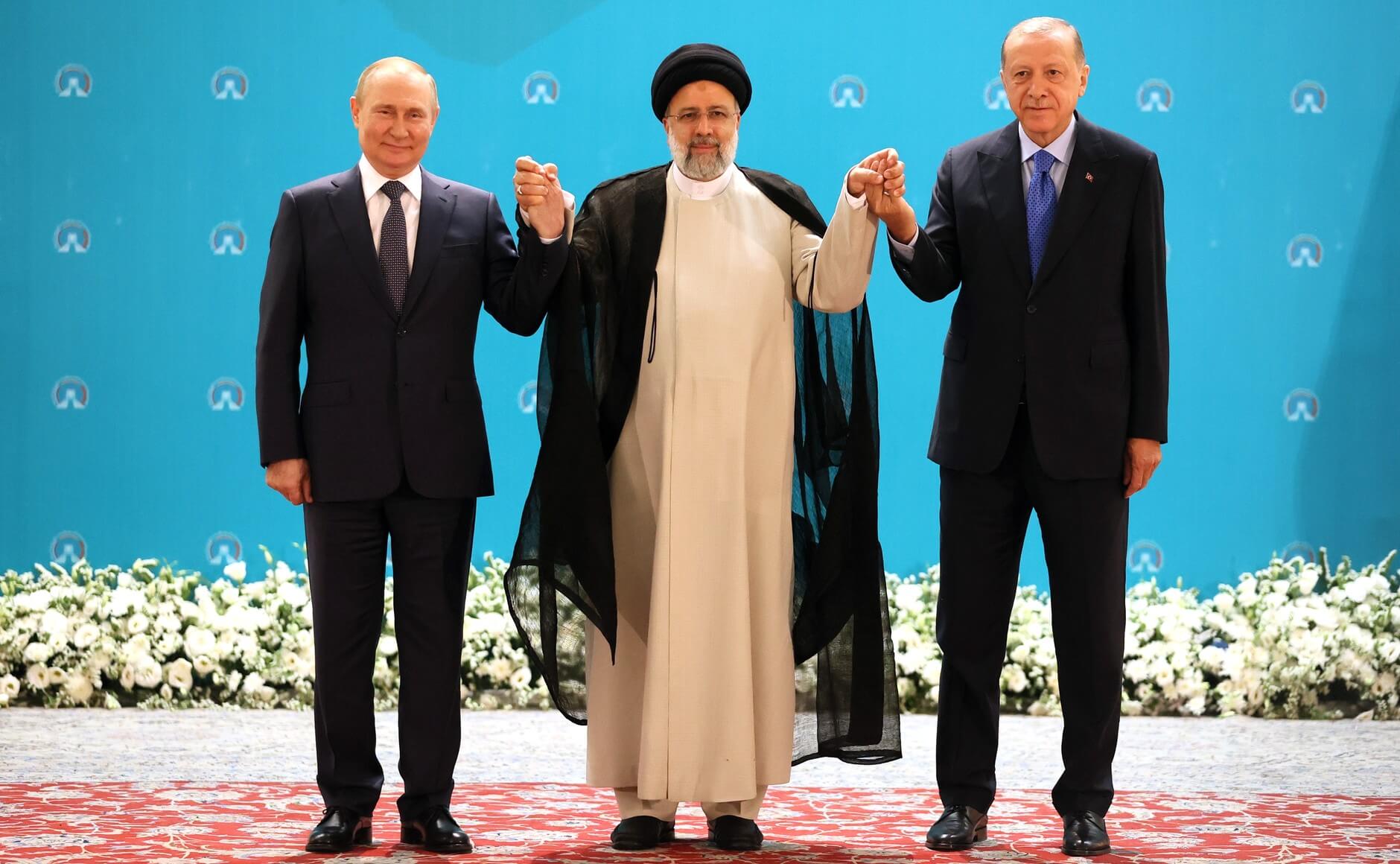In a joint statement at the seventh Summit of the Guarantor States of the Astana Process in Tehran on Tuesday, Iran, Russia, and Turkey condemned Israel’s continued military attacks on Syria, saying that its aggression is “destabilising and intensifying the tension” in the Middle East.
Iranian President Ebrahim Raisi also urged the United Nations Security Council (UNSC) to curb Israel’s aggression before it became “a major security problem.” “It has become clear to everyone that this (Israeli) regime has linked its survival to aggression and insecurity in our region, and such actions, along with the occupation of the Golan region, are a violation of the sovereignty of the Syrian state and a factor of instability and a threat to regional and international peace and security, the consequences of which will, of course, be faced by this occupying regime,” Raisi noted.
- They condemned continued military attacks on Syrian soil by #Israel, which they recognized as "violating international law" and Syria's territorial integrity.
— Maziar Motamedi (@MotamediMaziar) July 19, 2022
- They rejected all unilateral sanctions, and called on UN and others to provide assistance "without politicization".
His comments come just weeks after the three countries condemned Israeli airstrikes in Syria and days after Russia demanded an “unconditional cessation” of “irresponsible acts that violate Syria’s sovereignty and international law.”
At this week’s meeting, the trio opposed the “illegal seizure and transfer of oil,” stating that the proceeds from the sale of Syrian oil belong to Damascus, in reference to the United States’ (US) presence in the country. In this regard, Raisi accused the US of “looting Syria’s natural resources, especially their oil” and called on Washington to withdraw its forces from the “entire region, including Syria, as soon as possible.”
President Raisi: The illegitimate presence of the occupying forces of the American regime has become a destabilizing factor for #Syria and the region https://t.co/9FJ5EfYuhm pic.twitter.com/itTLWtRgXD
— Government of the Islamic Republic of Iran (@Iran_GOV) July 19, 2022
The leaders also rejected all unilateral sanctions imposed on Syria, which they said violate the United Nations (UN) Charter and would lead to the “disintegration” of the country. Raisi remarked that US sanctions “have put additional pressure on the Syrian people and deprived them of the possibility of a normal life.” In this regard, Russian President Vladimir Putin emphasised that the relevant UN agencies should “play a more significant role in providing assistance to the Syrians without politicisation and preconditions.”
The three presidents vowed to fight terrorism in all its forms and condemned the increase in the presence and activity of terrorist groups in different parts of Syria. They also rejected all “efforts aimed at creating new realities on the ground under the pretext of fighting terrorism.” In this respect, Putin noted that the threats of extremism come from territories not under the control of the Syrian government. He also highlighted that “this is largely facilitated by the destructive line of Western states led by the United States, which use a wide arsenal of means of political and economic influence, in every way encourage separatist aspirations in certain regions of the country, […] in order to ultimately bring the matter to the dismemberment of the Syrian state.”
President @RTErdogan:
— Republic of Türkiye Directorate of Communications (@Communications) July 19, 2022
"It must be clearly understood that there is no room for separatist terrorism and its extensions in the future of our region."
Meanwhile, Turkish President Recep Tayyip Erdoğan pointed out that Ankara does not see any difference between ISIS and other Syrian Kurdish terrorist groups such as the Kurdistan Workers’ Party (PKK), the Democratic Union Party (Syria) (PYD), or the People’s Defense Units (YPG). “Our fight against terrorist organisations will continue permanently without caring where they operate and who supports them. We are determined to eradicate from Syria the centers of evil that target our national security,” he declared, adding that he expects Russia and Iran to support them.
In a similar vein, Putin emphasised, “We need to put an end to the presence of ISIS and other extremist groups in Syria forever,” stressing that the Trans-Euphrates region, where “attempts are being made to consolidate an illegal foreign military presence and incite separatist sentiments in violation of the sovereignty of the Syrian state,” should be returned to the Syrian government.
Russia’s President Putin following the trilateral summit in Tehran:
— TRT World Now (@TRTWorldNow) July 19, 2022
- Russia, Iran and Türkiye are committed to normalisation in Syria
- Moscow and Ankara agreed to continue consultation on Syria
- Eastern part of Euphrates River should be under Syrian regime pic.twitter.com/oVidRiGj1m
Underlining their “unshakable commitment to the sovereignty, independence, unity and territorial integrity” of Syria, the Troika reaffirmed that “the Syrian conflict has no military solution” and can only be resolved through diplomacy. “The Syrians themselves should determine the future of Syria without imposing any ready-made recipes or models from outside,” Putin commented, noting that “everything necessary must be done” to resolve the Syrian refugee crisis.
In this regard, Erdoğan mentioned that Turkey hosts 3.7 million Syrians, which has led to added pressure on Ankara economically, stressing, “Our goal is to ensure our Syrian brothers and sisters’ voluntary, safe and dignified return to their country with peace in their hearts.”

